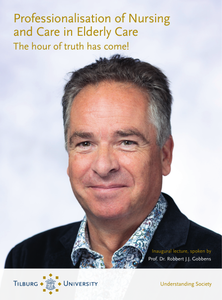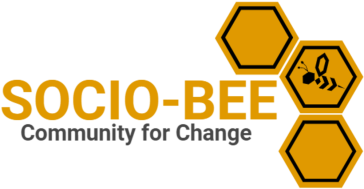Inaugural lecture, delivered upon public acceptance of the endowed professorship in Professionalisation of Nursing and Care in Elderly Care by Prof. Dr. Robbert J.J. Gobbens at Tilburg University on 29 September 2023.
DOCUMENT

In this article, we examine the relationship between important types of policies for asylum permit holders in the Netherlands and the improvement in their command of Dutch. As far as asylum policy is concerned, we find that participation in activities in the asylum seekers reception centre – and in particular, following Dutch language classes – contribute to an improvement in Syrian asylum permit holders’ command of Dutch. On the other hand, a prolonged period of stay and frequent relocations between reception centres are not favourable. Asylum permit holders who have successfully completed the civic integration programme have a better command of the language than asylum permit holders who are still undergoing the programme. An important finding is that there seems to be a sort of double deficit in the area of civic integration: not only do the elderly and lower educated make less progress in learning Dutch, but they are also the ones more likely to receive a dispensation from the civic integration requirement, which places them at a further disadvantage. Third, we find that early participation in the labour market or as a volunteer is also beneficial for language proficiency.
LINK
Aim: The prevalence of age‐related malnutrition is increasing in almost all Western countries. Because of their expertise, dietitians should have a central role in the management of malnutrition. This review aimed to synthesise the literature on the role of the dietitian in the management of malnutrition in the elderly in comparison with other health professionals. Methods: In November 2018, a search of Embase, Medline Ovid, Cinahl Ebscohost, Cochrane Central, Web of Science and Google Scholar was undertaken using ‘dietitian’, ‘elderly’ and ‘malnutrition’ as the main search terms. Qualitative and quantitative empirical research studies that focussed on the role of dietitians as the (main) subject of the study were included. Data extraction and data synthesis were performed by the three authors using a thematic synthesis approach. Results: Three themes emerged from the coding and synthesis of the 21 included studies. The first theme demonstrates that other health professionals' time for, and knowledge of, screening policies negatively affects the role of the dietitian. The second theme demonstrates that the importance of nutritional care is acknowledged. However, this does not always imply familiarity with dietetics nor does it always mean that other health professionals think involving dietitians is worth the effort. The third theme demonstrates that issues of workload appeared to be especially important in crossing or guarding role boundaries. Conclusions: The role of dietitians in managing age‐related malnutrition is not always clear and coherent. Therefore, how dietitians shape their role to provide optimal management of malnutrition in the elderly is open to debate. https://doi.org/10.1111/1747-0080.12546 LinkedIn: https://www.linkedin.com/in/matthijs-fleurke-66279110/ https://www.linkedin.com/in/dorien-voskuil-9b27b115/
MULTIFILE

While several governmental and research efforts are set upon mobility-as-a-service (MaaS), most of them are driven by individual travel behavior and potential usage. Scholars argue that this is a too narrow perspective when evaluating government projects because choices individuals make in a private setting might not accurately reflect their preferences towards public policy. Participatory Value Evaluation (PVE) is a novel evaluation framework specifically designed to alleviate this issue by analyzing preferences on the allocation of public budgets. Thus, based on PVE, this project aims at assessing different features of MaaS-services (e.g. enhancing mobility of the elderly and the poor, complementing public transport, etc.) from a social desirability perspective and compare them with investments in alternative social projects. Specifically, it aims at establishing the citizen value of MaaS as compared to social investments in green/recreational areas or transport infrastructure (e.g. bike or bus lanes), and eliciting trade-offs between different features of them. The project includes the selection of different investment projects (and their features) that are politically relevant in Rotterdam. It also includes a qualitative assessment on the way individuals evaluate different social projects and their features and a quantitative assessment based on choice models that allow eliciting trade-offs between different attributes and projects. Finally, policy recommendations are provided based on these results. They allow conceiving investments projects to maximize the societal benefits as well as to construct optimal investment portfolios. This information is to be used as a complement of the evaluation of projects on the basis of individual preferences.
SOCIO-BEE proposes that community engagement and social innovation combined with Citizen Science (CS) through emerging technologies and playful interaction can bridge the gap between the capacity of communities to adopt more sustainable behaviours aligned with environmental policy objectives and between the citizen intentions and the real behaviour to act in favour of the environment (in this project, to reduce air pollution). Furthermore, community engagement can raise other citizens’ awareness of climate change and their own responses to it, through experimentation, better monitoring, and observation of the environment. This idea is emphasised in this project through the metaphor of bees’ behaviour (with queens, working and drone bees as main CS actors), interested stakeholders that aim at learning from results of CS evidence-based research (honey bears) and the Citizen Science hives as incubators of CS ideas and projects that will be tested in three different pilot sites (Ancona, Marousi and Ancona) and with different population: elderly people, everyday commuters and young adults, respectively. The SOCIO-BEE project ambitions the scalable activation of changes in citizens’ behaviour in support of pro-environment action groups, local sponsors, voluntary sector and policies in cities. This process will be carried out through low-cost technological innovations (CS enablers within the SOCIO BEE platform), together with the creation of proper instruments for institutions (Whitebook and toolkits with recommendations) that will contribute to the replication, upscaling, massive adoption and to the duration of the SOCIO-BEE project. The solution sustainability and maximum outreach will be ensured by proposing a set of public-private partnerships.For more information see the EU-website.
